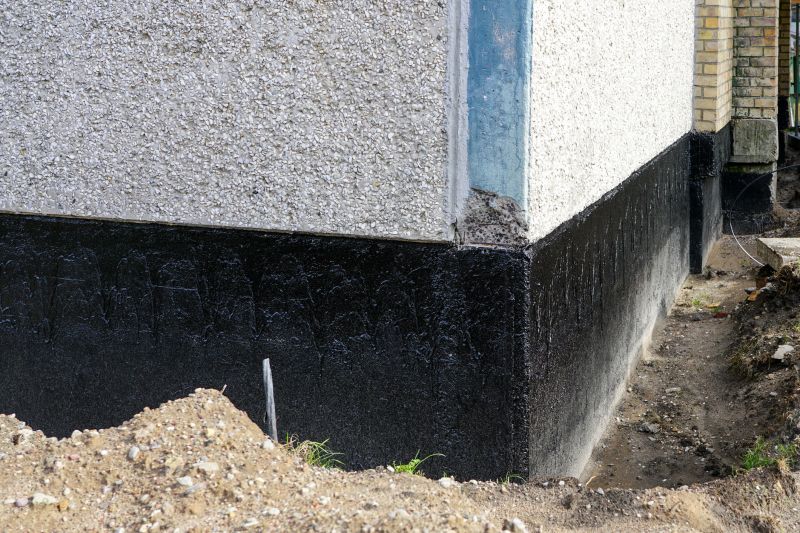Leading Waterproofing Products for Reliable Protection
Discover top waterproofing solutions designed to safeguard your property from moisture and water damage effectively.
 Waterproofing products are essential solutions for protecting structures from water infiltration and damage. They are utilized in a variety of applications, including basements, roofs, foundations, and exterior walls. The right waterproofing material can help prevent issues such as mold growth, wood rot, and structural deterioration, ensuring the longevity and integrity of buildings. Selecting suitable waterproofing products requires understanding the specific needs of the project, including surface type, exposure conditions, and durability requirements.
Waterproofing products are essential solutions for protecting structures from water infiltration and damage. They are utilized in a variety of applications, including basements, roofs, foundations, and exterior walls. The right waterproofing material can help prevent issues such as mold growth, wood rot, and structural deterioration, ensuring the longevity and integrity of buildings. Selecting suitable waterproofing products requires understanding the specific needs of the project, including surface type, exposure conditions, and durability requirements.
Top Overall Option
Liquid Waterproofing Membrane
A liquid waterproofing membrane offers a seamless, flexible barrier that conforms to various surfaces, making it suitable for a wide range of applications. It is easy to apply with brushes, rollers, or sprayers, and provides durable protection against water infiltration. This versatile solution is often used on roofs, basements, and foundations, providing a continuous layer that minimizes the risk of leaks or cracks. Its adaptability and ease of use make it a popular choice for both professional contractors and DIY enthusiasts in Madison, IN.
Types of Products For Waterproofings
Bituminous Membranes
Sheet-based waterproofing that offers durable, weather-resistant protection, commonly used on roofs and foundations.
Liquid Rubber Coatings
Flexible liquid coatings that form seamless waterproof barriers, suitable for roofs, decks, and basements.
Polyurethane Sealants
High-performance sealants ideal for sealing cracks, joints, and gaps in various surfaces.
Cementitious Waterproof Coatings
Waterproof coatings made from cement-based materials, often applied to basement walls and concrete structures.
Spray-On Waterproofing
Spray-applied solutions that create a protective waterproof layer on large or irregular surfaces.
Waterproofing Paints
Paints with waterproofing properties, used to add an extra layer of protection to exterior walls and surfaces.
Sheet Membranes
Pre-formed sheets that provide a reliable waterproof barrier, often used in foundation and roofing applications.
Sealant Tapes
Flexible tapes designed to seal joints, cracks, and seams effectively against water intrusion.
Crack Injection Systems
Specialized solutions for filling and sealing cracks in concrete or masonry structures.
Hydrophobic Sealants
Sealants that repel water and are used to treat surfaces susceptible to moisture penetration.
Waterproofing Fabrics and Membranes
Heavy-duty fabrics combined with waterproof membranes for structural waterproofing applications.
Flexible Waterproofing Sheets
Sheets that accommodate structural movement while maintaining waterproof integrity.
Popular Choices
A popular choice for its seamless application and adaptability across various surfaces.
Widely used for their proven durability in roofing and foundation waterproofing.
Favored for their strong adhesion and flexibility in sealing joints and cracks.
Commonly selected for their ease of application on exterior walls.
Popular for covering large areas efficiently and creating a uniform waterproof layer.
Trusted for their reliability in foundation waterproofing and roofing projects.
Convenient for quick sealing of seams and joints in various construction contexts.
Often used in basement and cellar applications for their compatibility with concrete surfaces.
Effective for repairing and sealing structural cracks in concrete surfaces.
Chosen for their water-repelling properties in moisture-prone areas.
Utilized in structural waterproofing to provide added protection in complex assemblies.
Different waterproofing solutions are designed to address various challenges. For example, liquid membranes can provide seamless coverage on irregular surfaces, while sheet membranes are often favored for their ease of installation on flat areas. Sealants and coatings serve as additional barriers to water penetration, especially in joints and cracks. When considering waterproofing options, it is important to evaluate factors like ease of application, compatibility with existing materials, and the level of water exposure expected.
Proper preparation of surfaces before applying waterproofing products enhances their effectiveness. Surfaces should be clean, dry, and free of debris or loose material. In some cases, primers or bonding agents are recommended to improve adhesion. Regular maintenance and inspection are also crucial to ensure ongoing protection, especially in areas prone to frequent water exposure or freeze-thaw cycles. Consulting with professionals or thoroughly researching product specifications can help identify the most suitable waterproofing solutions for your specific project needs.
In Madison, IN, homeowners and contractors alike prioritize reliable waterproofing to safeguard properties against local weather conditions and moisture challenges. Whether working on residential foundations or commercial roofing, choosing the right products can make a significant difference in the durability and performance of waterproofing systems. Always consider product versatility, application methods, and long-term performance when selecting waterproofing materials for any project.
Key Buying Considerations
- Determine the specific area or surface to be waterproofed, such as roof, foundation, or walls.
- Assess the level of water exposure and whether the environment is subject to constant or intermittent moisture.
- Choose a product compatible with the existing surface material, whether concrete, wood, or masonry.
- Consider the ease of application and whether professional installation is required or if DIY is feasible.
- Evaluate the flexibility and movement accommodation of the waterproofing material to prevent cracking over time.
- Review the product’s durability and expected lifespan under local weather conditions in Madison, IN.
- Check for surface preparation requirements to ensure optimal adhesion and performance.
- Identify if the product offers seamless coverage or requires multiple layers for effectiveness.
- Consider whether the waterproofing solution is suitable for interior, exterior, or both types of applications.
- Review safety instructions and whether protective gear or special handling is necessary during application.
- Assess the need for additional components such as primers, sealants, or tapes to complement the main waterproofing product.
- Look into the manufacturer's recommendations for maintenance and reapplication intervals.
- Determine budget constraints while balancing quality and longevity of the waterproofing solution.
- Research local building codes or regulations to ensure compliance with waterproofing standards.
